Reflective Paper: Leadership in Haematology, Oncology and BMT Nursing
VerifiedAdded on 2020/07/23
|18
|5430
|115
Report
AI Summary
This reflective paper explores leadership approaches in nursing, specifically focusing on transformational leadership within a Haematology, Oncology, and Bone Marrow Transplant ward. The paper begins with an introduction to nursing's crucial role in patient care, highlighting the emotional and physical challenges faced by patients in this specialized setting. It provides a practical example of transformational leadership in action, illustrating how a nurse effectively calmed a distressed patient through empathetic communication and evidence-based information. The report then identifies and describes the transformational leadership approach, emphasizing its key characteristics such as idealized influence, intellectual stimulation, individualized consideration, and inspirational motivation. The paper reflects on these characteristics, providing examples from the clinical scenario and discussing their impact on teamwork, communication, and problem-solving. Furthermore, the paper outlines a 12-24 month plan for skill development, focusing on the aspiring nursing role and the factors essential for a successful transition into a new role. The reflective paper emphasizes the importance of leadership in improving patient outcomes and fostering a supportive environment for both patients and healthcare professionals.

REFLECTIVE PAPER
Paraphrase This Document
Need a fresh take? Get an instant paraphrase of this document with our AI Paraphraser
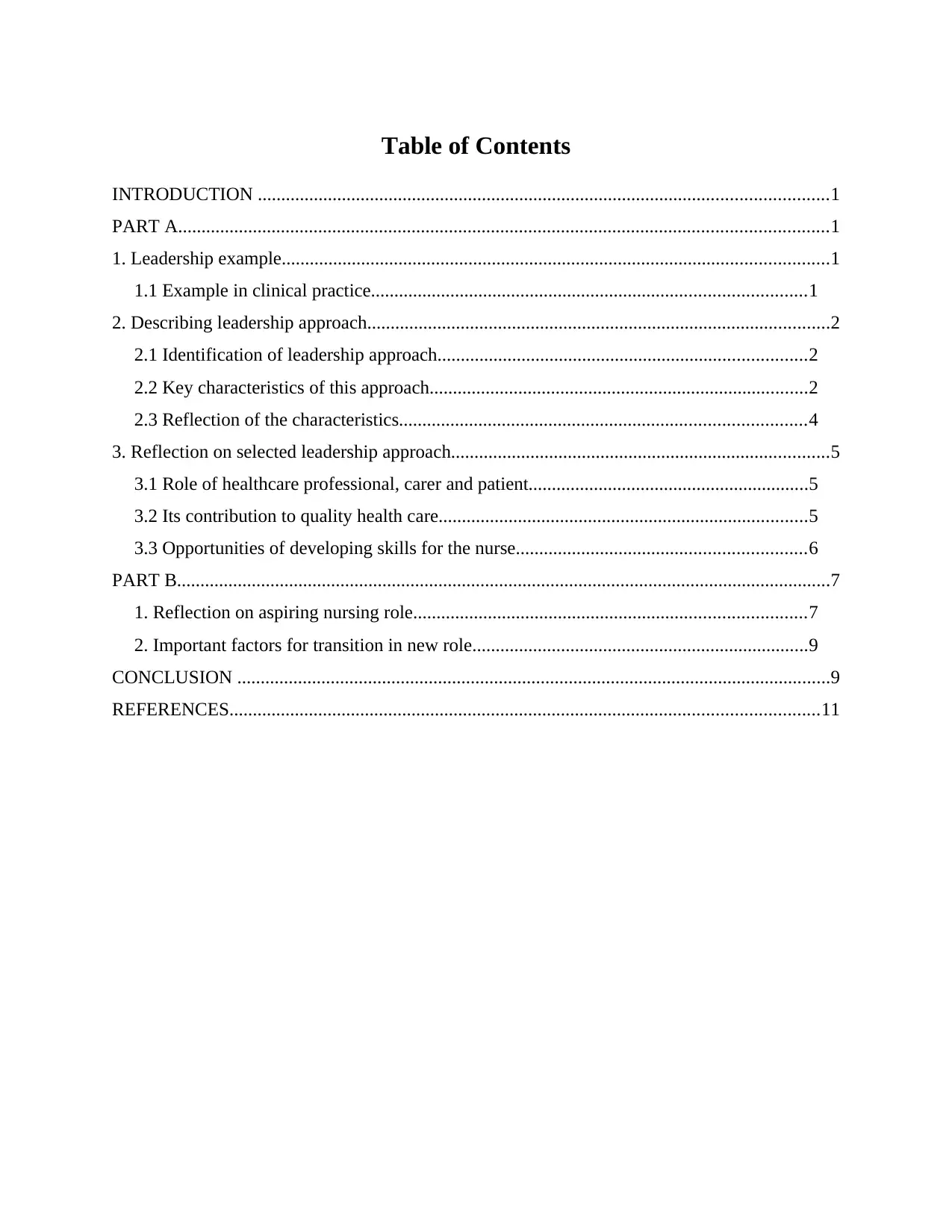
Table of Contents
INTRODUCTION ..........................................................................................................................1
PART A...........................................................................................................................................1
1. Leadership example.....................................................................................................................1
1.1 Example in clinical practice.............................................................................................1
2. Describing leadership approach...................................................................................................2
2.1 Identification of leadership approach...............................................................................2
2.2 Key characteristics of this approach.................................................................................2
2.3 Reflection of the characteristics.......................................................................................4
3. Reflection on selected leadership approach.................................................................................5
3.1 Role of healthcare professional, carer and patient............................................................5
3.2 Its contribution to quality health care...............................................................................5
3.3 Opportunities of developing skills for the nurse..............................................................6
PART B............................................................................................................................................7
1. Reflection on aspiring nursing role....................................................................................7
2. Important factors for transition in new role........................................................................9
CONCLUSION ...............................................................................................................................9
REFERENCES..............................................................................................................................11
INTRODUCTION ..........................................................................................................................1
PART A...........................................................................................................................................1
1. Leadership example.....................................................................................................................1
1.1 Example in clinical practice.............................................................................................1
2. Describing leadership approach...................................................................................................2
2.1 Identification of leadership approach...............................................................................2
2.2 Key characteristics of this approach.................................................................................2
2.3 Reflection of the characteristics.......................................................................................4
3. Reflection on selected leadership approach.................................................................................5
3.1 Role of healthcare professional, carer and patient............................................................5
3.2 Its contribution to quality health care...............................................................................5
3.3 Opportunities of developing skills for the nurse..............................................................6
PART B............................................................................................................................................7
1. Reflection on aspiring nursing role....................................................................................7
2. Important factors for transition in new role........................................................................9
CONCLUSION ...............................................................................................................................9
REFERENCES..............................................................................................................................11

Illustration Index
Illustration 1: Transformational leadership .....................................................................................3
Illustration 1: Transformational leadership .....................................................................................3
⊘ This is a preview!⊘
Do you want full access?
Subscribe today to unlock all pages.

Trusted by 1+ million students worldwide

Index of Tables
Table 1: Activities map for 12 to 24 months...................................................................................7
Table 1: Activities map for 12 to 24 months...................................................................................7
Paraphrase This Document
Need a fresh take? Get an instant paraphrase of this document with our AI Paraphraser
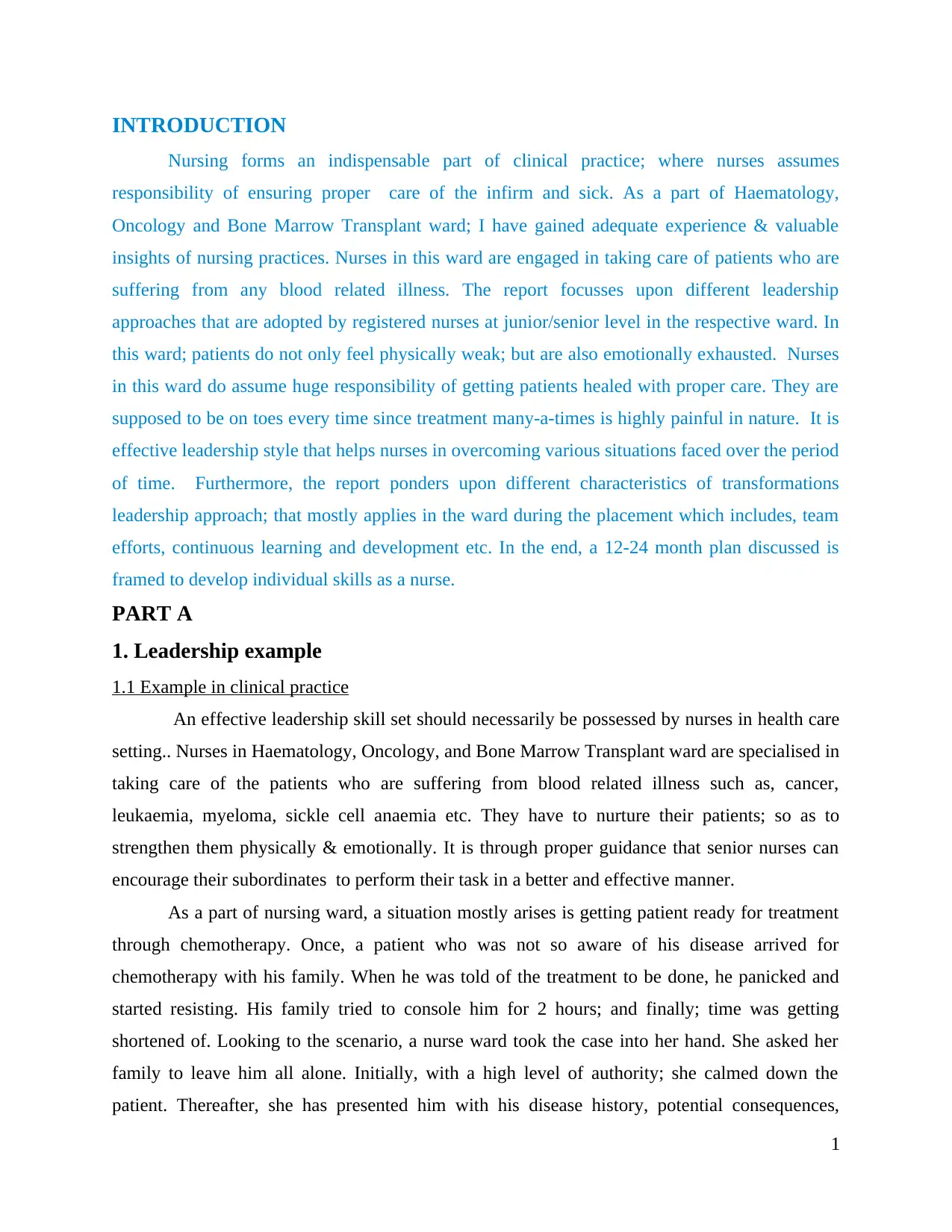
INTRODUCTION
Nursing forms an indispensable part of clinical practice; where nurses assumes
responsibility of ensuring proper care of the infirm and sick. As a part of Haematology,
Oncology and Bone Marrow Transplant ward; I have gained adequate experience & valuable
insights of nursing practices. Nurses in this ward are engaged in taking care of patients who are
suffering from any blood related illness. The report focusses upon different leadership
approaches that are adopted by registered nurses at junior/senior level in the respective ward. In
this ward; patients do not only feel physically weak; but are also emotionally exhausted. Nurses
in this ward do assume huge responsibility of getting patients healed with proper care. They are
supposed to be on toes every time since treatment many-a-times is highly painful in nature. It is
effective leadership style that helps nurses in overcoming various situations faced over the period
of time. Furthermore, the report ponders upon different characteristics of transformations
leadership approach; that mostly applies in the ward during the placement which includes, team
efforts, continuous learning and development etc. In the end, a 12-24 month plan discussed is
framed to develop individual skills as a nurse.
PART A
1. Leadership example
1.1 Example in clinical practice
An effective leadership skill set should necessarily be possessed by nurses in health care
setting.. Nurses in Haematology, Oncology, and Bone Marrow Transplant ward are specialised in
taking care of the patients who are suffering from blood related illness such as, cancer,
leukaemia, myeloma, sickle cell anaemia etc. They have to nurture their patients; so as to
strengthen them physically & emotionally. It is through proper guidance that senior nurses can
encourage their subordinates to perform their task in a better and effective manner.
As a part of nursing ward, a situation mostly arises is getting patient ready for treatment
through chemotherapy. Once, a patient who was not so aware of his disease arrived for
chemotherapy with his family. When he was told of the treatment to be done, he panicked and
started resisting. His family tried to console him for 2 hours; and finally; time was getting
shortened of. Looking to the scenario, a nurse ward took the case into her hand. She asked her
family to leave him all alone. Initially, with a high level of authority; she calmed down the
patient. Thereafter, she has presented him with his disease history, potential consequences,
1
Nursing forms an indispensable part of clinical practice; where nurses assumes
responsibility of ensuring proper care of the infirm and sick. As a part of Haematology,
Oncology and Bone Marrow Transplant ward; I have gained adequate experience & valuable
insights of nursing practices. Nurses in this ward are engaged in taking care of patients who are
suffering from any blood related illness. The report focusses upon different leadership
approaches that are adopted by registered nurses at junior/senior level in the respective ward. In
this ward; patients do not only feel physically weak; but are also emotionally exhausted. Nurses
in this ward do assume huge responsibility of getting patients healed with proper care. They are
supposed to be on toes every time since treatment many-a-times is highly painful in nature. It is
effective leadership style that helps nurses in overcoming various situations faced over the period
of time. Furthermore, the report ponders upon different characteristics of transformations
leadership approach; that mostly applies in the ward during the placement which includes, team
efforts, continuous learning and development etc. In the end, a 12-24 month plan discussed is
framed to develop individual skills as a nurse.
PART A
1. Leadership example
1.1 Example in clinical practice
An effective leadership skill set should necessarily be possessed by nurses in health care
setting.. Nurses in Haematology, Oncology, and Bone Marrow Transplant ward are specialised in
taking care of the patients who are suffering from blood related illness such as, cancer,
leukaemia, myeloma, sickle cell anaemia etc. They have to nurture their patients; so as to
strengthen them physically & emotionally. It is through proper guidance that senior nurses can
encourage their subordinates to perform their task in a better and effective manner.
As a part of nursing ward, a situation mostly arises is getting patient ready for treatment
through chemotherapy. Once, a patient who was not so aware of his disease arrived for
chemotherapy with his family. When he was told of the treatment to be done, he panicked and
started resisting. His family tried to console him for 2 hours; and finally; time was getting
shortened of. Looking to the scenario, a nurse ward took the case into her hand. She asked her
family to leave him all alone. Initially, with a high level of authority; she calmed down the
patient. Thereafter, she has presented him with his disease history, potential consequences,
1
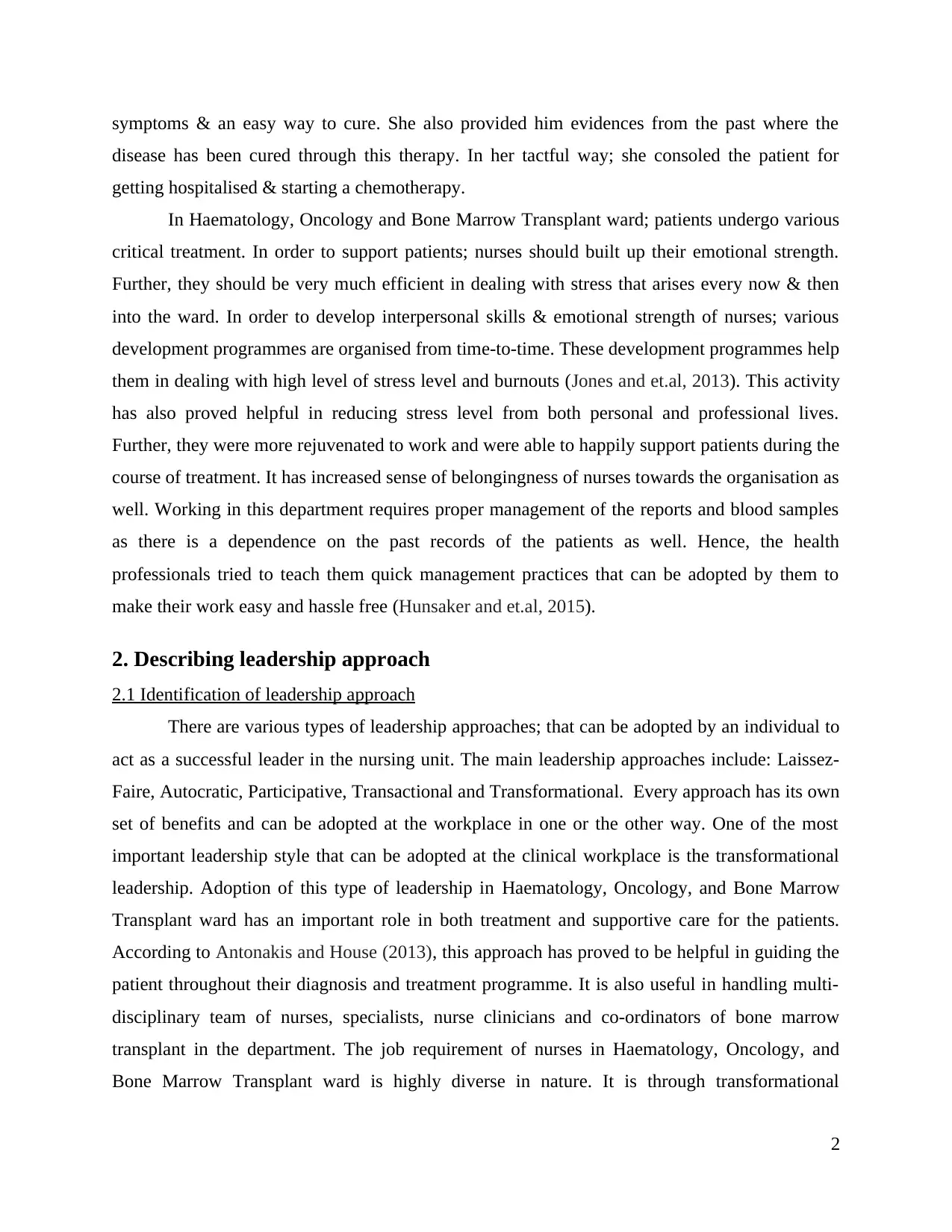
symptoms & an easy way to cure. She also provided him evidences from the past where the
disease has been cured through this therapy. In her tactful way; she consoled the patient for
getting hospitalised & starting a chemotherapy.
In Haematology, Oncology and Bone Marrow Transplant ward; patients undergo various
critical treatment. In order to support patients; nurses should built up their emotional strength.
Further, they should be very much efficient in dealing with stress that arises every now & then
into the ward. In order to develop interpersonal skills & emotional strength of nurses; various
development programmes are organised from time-to-time. These development programmes help
them in dealing with high level of stress level and burnouts (Jones and et.al, 2013). This activity
has also proved helpful in reducing stress level from both personal and professional lives.
Further, they were more rejuvenated to work and were able to happily support patients during the
course of treatment. It has increased sense of belongingness of nurses towards the organisation as
well. Working in this department requires proper management of the reports and blood samples
as there is a dependence on the past records of the patients as well. Hence, the health
professionals tried to teach them quick management practices that can be adopted by them to
make their work easy and hassle free (Hunsaker and et.al, 2015).
2. Describing leadership approach
2.1 Identification of leadership approach
There are various types of leadership approaches; that can be adopted by an individual to
act as a successful leader in the nursing unit. The main leadership approaches include: Laissez-
Faire, Autocratic, Participative, Transactional and Transformational. Every approach has its own
set of benefits and can be adopted at the workplace in one or the other way. One of the most
important leadership style that can be adopted at the clinical workplace is the transformational
leadership. Adoption of this type of leadership in Haematology, Oncology, and Bone Marrow
Transplant ward has an important role in both treatment and supportive care for the patients.
According to Antonakis and House (2013), this approach has proved to be helpful in guiding the
patient throughout their diagnosis and treatment programme. It is also useful in handling multi-
disciplinary team of nurses, specialists, nurse clinicians and co-ordinators of bone marrow
transplant in the department. The job requirement of nurses in Haematology, Oncology, and
Bone Marrow Transplant ward is highly diverse in nature. It is through transformational
2
disease has been cured through this therapy. In her tactful way; she consoled the patient for
getting hospitalised & starting a chemotherapy.
In Haematology, Oncology and Bone Marrow Transplant ward; patients undergo various
critical treatment. In order to support patients; nurses should built up their emotional strength.
Further, they should be very much efficient in dealing with stress that arises every now & then
into the ward. In order to develop interpersonal skills & emotional strength of nurses; various
development programmes are organised from time-to-time. These development programmes help
them in dealing with high level of stress level and burnouts (Jones and et.al, 2013). This activity
has also proved helpful in reducing stress level from both personal and professional lives.
Further, they were more rejuvenated to work and were able to happily support patients during the
course of treatment. It has increased sense of belongingness of nurses towards the organisation as
well. Working in this department requires proper management of the reports and blood samples
as there is a dependence on the past records of the patients as well. Hence, the health
professionals tried to teach them quick management practices that can be adopted by them to
make their work easy and hassle free (Hunsaker and et.al, 2015).
2. Describing leadership approach
2.1 Identification of leadership approach
There are various types of leadership approaches; that can be adopted by an individual to
act as a successful leader in the nursing unit. The main leadership approaches include: Laissez-
Faire, Autocratic, Participative, Transactional and Transformational. Every approach has its own
set of benefits and can be adopted at the workplace in one or the other way. One of the most
important leadership style that can be adopted at the clinical workplace is the transformational
leadership. Adoption of this type of leadership in Haematology, Oncology, and Bone Marrow
Transplant ward has an important role in both treatment and supportive care for the patients.
According to Antonakis and House (2013), this approach has proved to be helpful in guiding the
patient throughout their diagnosis and treatment programme. It is also useful in handling multi-
disciplinary team of nurses, specialists, nurse clinicians and co-ordinators of bone marrow
transplant in the department. The job requirement of nurses in Haematology, Oncology, and
Bone Marrow Transplant ward is highly diverse in nature. It is through transformational
2
⊘ This is a preview!⊘
Do you want full access?
Subscribe today to unlock all pages.

Trusted by 1+ million students worldwide
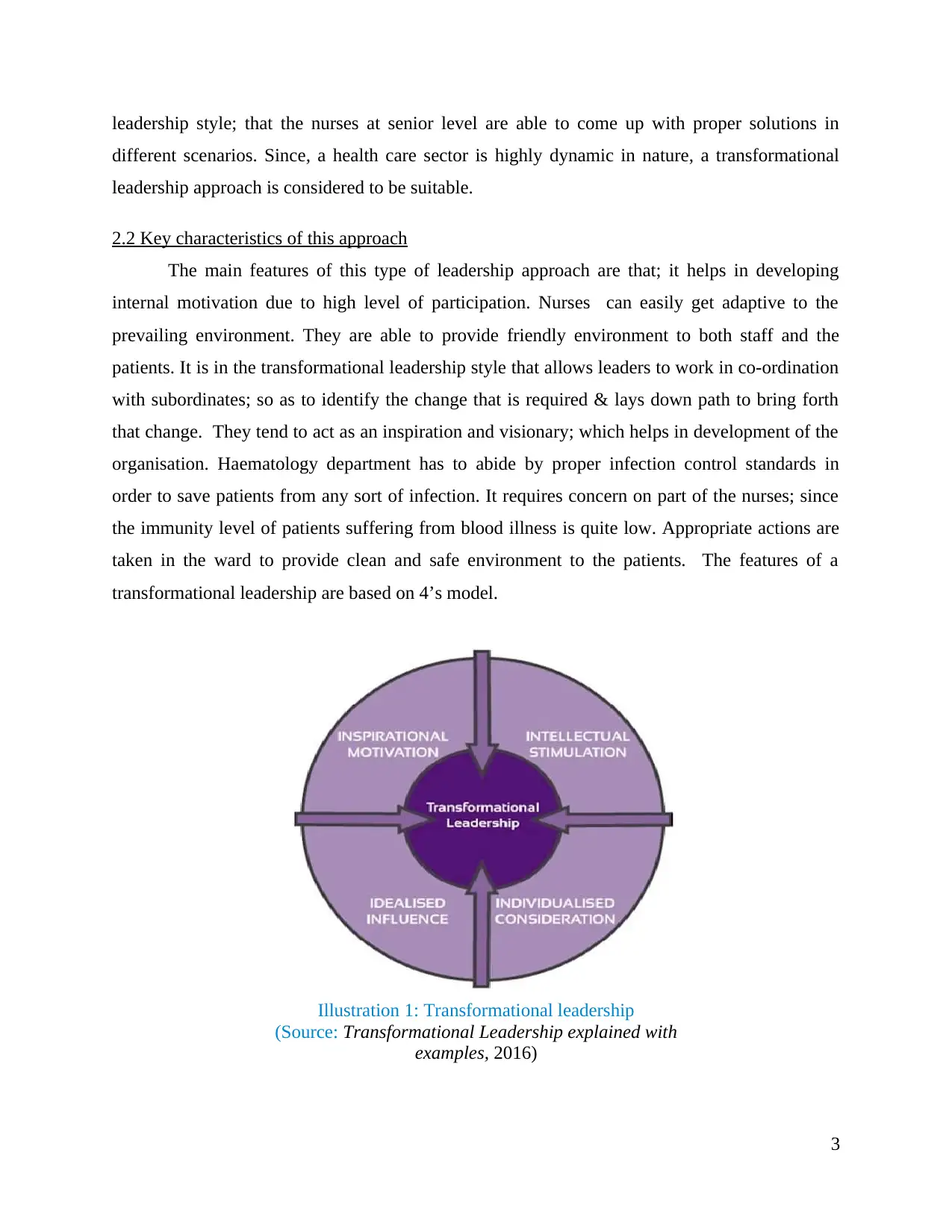
leadership style; that the nurses at senior level are able to come up with proper solutions in
different scenarios. Since, a health care sector is highly dynamic in nature, a transformational
leadership approach is considered to be suitable.
2.2 Key characteristics of this approach
The main features of this type of leadership approach are that; it helps in developing
internal motivation due to high level of participation. Nurses can easily get adaptive to the
prevailing environment. They are able to provide friendly environment to both staff and the
patients. It is in the transformational leadership style that allows leaders to work in co-ordination
with subordinates; so as to identify the change that is required & lays down path to bring forth
that change. They tend to act as an inspiration and visionary; which helps in development of the
organisation. Haematology department has to abide by proper infection control standards in
order to save patients from any sort of infection. It requires concern on part of the nurses; since
the immunity level of patients suffering from blood illness is quite low. Appropriate actions are
taken in the ward to provide clean and safe environment to the patients. The features of a
transformational leadership are based on 4’s model.
3
Illustration 1: Transformational leadership
(Source: Transformational Leadership explained with
examples, 2016)
different scenarios. Since, a health care sector is highly dynamic in nature, a transformational
leadership approach is considered to be suitable.
2.2 Key characteristics of this approach
The main features of this type of leadership approach are that; it helps in developing
internal motivation due to high level of participation. Nurses can easily get adaptive to the
prevailing environment. They are able to provide friendly environment to both staff and the
patients. It is in the transformational leadership style that allows leaders to work in co-ordination
with subordinates; so as to identify the change that is required & lays down path to bring forth
that change. They tend to act as an inspiration and visionary; which helps in development of the
organisation. Haematology department has to abide by proper infection control standards in
order to save patients from any sort of infection. It requires concern on part of the nurses; since
the immunity level of patients suffering from blood illness is quite low. Appropriate actions are
taken in the ward to provide clean and safe environment to the patients. The features of a
transformational leadership are based on 4’s model.
3
Illustration 1: Transformational leadership
(Source: Transformational Leadership explained with
examples, 2016)
Paraphrase This Document
Need a fresh take? Get an instant paraphrase of this document with our AI Paraphraser
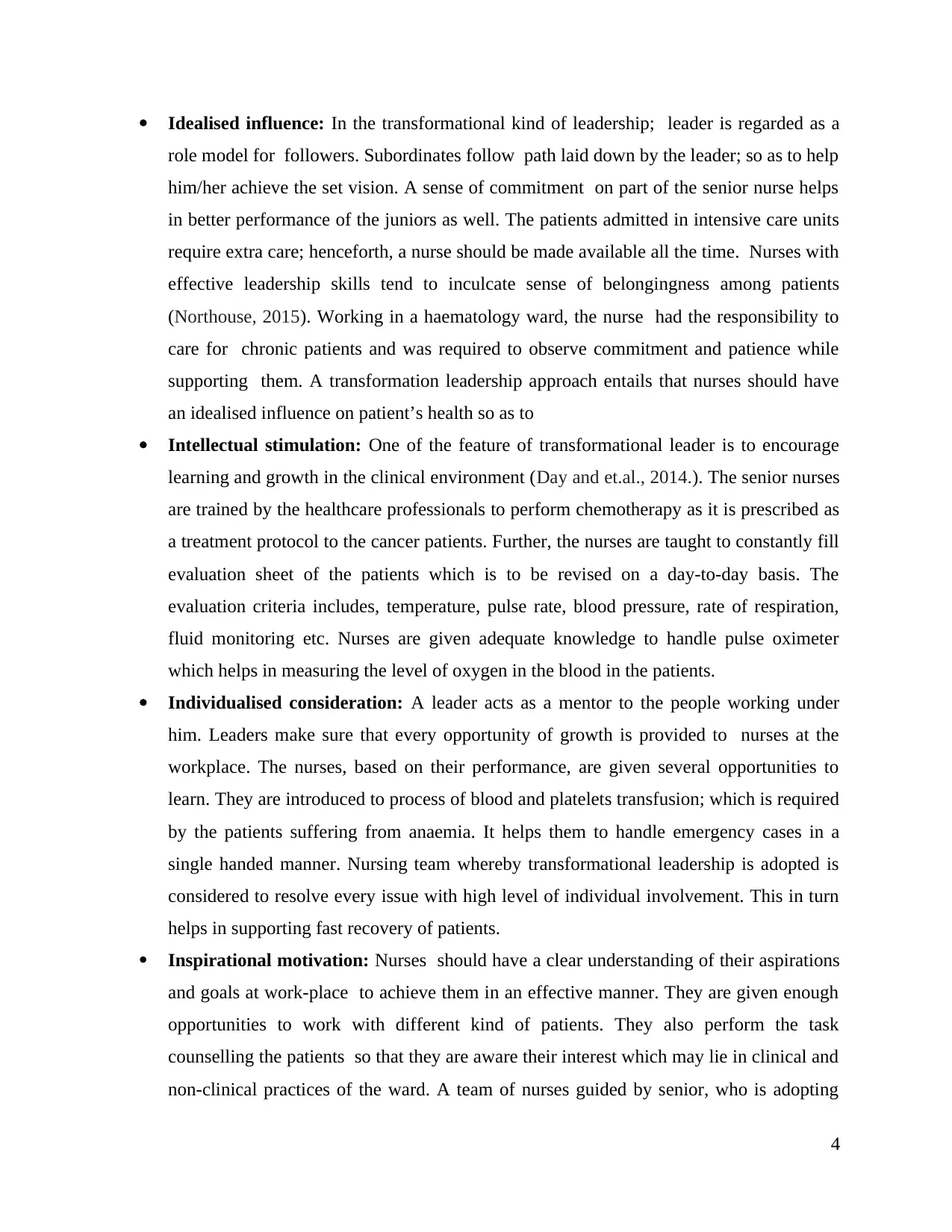
Idealised influence: In the transformational kind of leadership; leader is regarded as a
role model for followers. Subordinates follow path laid down by the leader; so as to help
him/her achieve the set vision. A sense of commitment on part of the senior nurse helps
in better performance of the juniors as well. The patients admitted in intensive care units
require extra care; henceforth, a nurse should be made available all the time. Nurses with
effective leadership skills tend to inculcate sense of belongingness among patients
(Northouse, 2015). Working in a haematology ward, the nurse had the responsibility to
care for chronic patients and was required to observe commitment and patience while
supporting them. A transformation leadership approach entails that nurses should have
an idealised influence on patient’s health so as to
Intellectual stimulation: One of the feature of transformational leader is to encourage
learning and growth in the clinical environment (Day and et.al., 2014.). The senior nurses
are trained by the healthcare professionals to perform chemotherapy as it is prescribed as
a treatment protocol to the cancer patients. Further, the nurses are taught to constantly fill
evaluation sheet of the patients which is to be revised on a day-to-day basis. The
evaluation criteria includes, temperature, pulse rate, blood pressure, rate of respiration,
fluid monitoring etc. Nurses are given adequate knowledge to handle pulse oximeter
which helps in measuring the level of oxygen in the blood in the patients.
Individualised consideration: A leader acts as a mentor to the people working under
him. Leaders make sure that every opportunity of growth is provided to nurses at the
workplace. The nurses, based on their performance, are given several opportunities to
learn. They are introduced to process of blood and platelets transfusion; which is required
by the patients suffering from anaemia. It helps them to handle emergency cases in a
single handed manner. Nursing team whereby transformational leadership is adopted is
considered to resolve every issue with high level of individual involvement. This in turn
helps in supporting fast recovery of patients.
Inspirational motivation: Nurses should have a clear understanding of their aspirations
and goals at work-place to achieve them in an effective manner. They are given enough
opportunities to work with different kind of patients. They also perform the task
counselling the patients so that they are aware their interest which may lie in clinical and
non-clinical practices of the ward. A team of nurses guided by senior, who is adopting
4
role model for followers. Subordinates follow path laid down by the leader; so as to help
him/her achieve the set vision. A sense of commitment on part of the senior nurse helps
in better performance of the juniors as well. The patients admitted in intensive care units
require extra care; henceforth, a nurse should be made available all the time. Nurses with
effective leadership skills tend to inculcate sense of belongingness among patients
(Northouse, 2015). Working in a haematology ward, the nurse had the responsibility to
care for chronic patients and was required to observe commitment and patience while
supporting them. A transformation leadership approach entails that nurses should have
an idealised influence on patient’s health so as to
Intellectual stimulation: One of the feature of transformational leader is to encourage
learning and growth in the clinical environment (Day and et.al., 2014.). The senior nurses
are trained by the healthcare professionals to perform chemotherapy as it is prescribed as
a treatment protocol to the cancer patients. Further, the nurses are taught to constantly fill
evaluation sheet of the patients which is to be revised on a day-to-day basis. The
evaluation criteria includes, temperature, pulse rate, blood pressure, rate of respiration,
fluid monitoring etc. Nurses are given adequate knowledge to handle pulse oximeter
which helps in measuring the level of oxygen in the blood in the patients.
Individualised consideration: A leader acts as a mentor to the people working under
him. Leaders make sure that every opportunity of growth is provided to nurses at the
workplace. The nurses, based on their performance, are given several opportunities to
learn. They are introduced to process of blood and platelets transfusion; which is required
by the patients suffering from anaemia. It helps them to handle emergency cases in a
single handed manner. Nursing team whereby transformational leadership is adopted is
considered to resolve every issue with high level of individual involvement. This in turn
helps in supporting fast recovery of patients.
Inspirational motivation: Nurses should have a clear understanding of their aspirations
and goals at work-place to achieve them in an effective manner. They are given enough
opportunities to work with different kind of patients. They also perform the task
counselling the patients so that they are aware their interest which may lie in clinical and
non-clinical practices of the ward. A team of nurses guided by senior, who is adopting
4
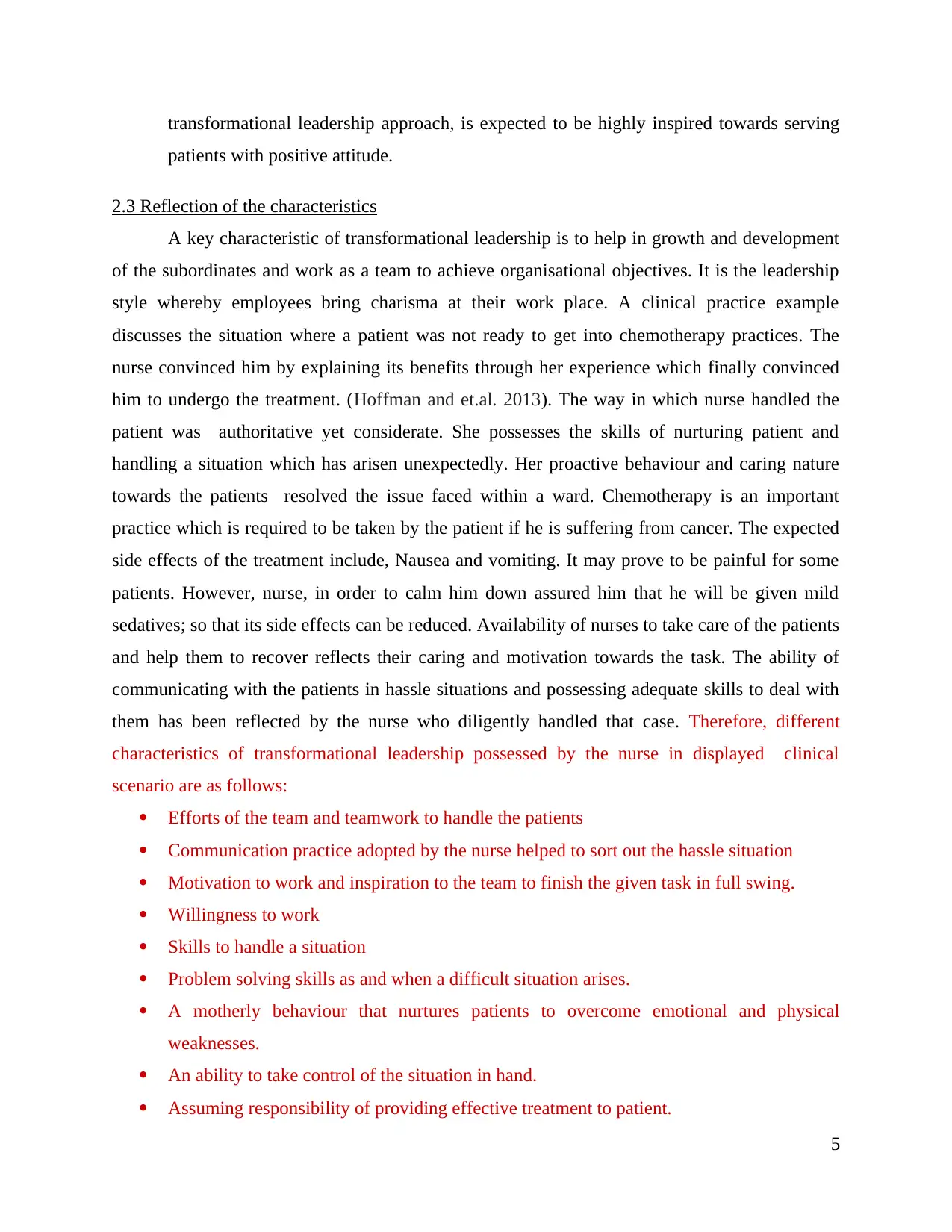
transformational leadership approach, is expected to be highly inspired towards serving
patients with positive attitude.
2.3 Reflection of the characteristics
A key characteristic of transformational leadership is to help in growth and development
of the subordinates and work as a team to achieve organisational objectives. It is the leadership
style whereby employees bring charisma at their work place. A clinical practice example
discusses the situation where a patient was not ready to get into chemotherapy practices. The
nurse convinced him by explaining its benefits through her experience which finally convinced
him to undergo the treatment. (Hoffman and et.al. 2013). The way in which nurse handled the
patient was authoritative yet considerate. She possesses the skills of nurturing patient and
handling a situation which has arisen unexpectedly. Her proactive behaviour and caring nature
towards the patients resolved the issue faced within a ward. Chemotherapy is an important
practice which is required to be taken by the patient if he is suffering from cancer. The expected
side effects of the treatment include, Nausea and vomiting. It may prove to be painful for some
patients. However, nurse, in order to calm him down assured him that he will be given mild
sedatives; so that its side effects can be reduced. Availability of nurses to take care of the patients
and help them to recover reflects their caring and motivation towards the task. The ability of
communicating with the patients in hassle situations and possessing adequate skills to deal with
them has been reflected by the nurse who diligently handled that case. Therefore, different
characteristics of transformational leadership possessed by the nurse in displayed clinical
scenario are as follows:
Efforts of the team and teamwork to handle the patients
Communication practice adopted by the nurse helped to sort out the hassle situation
Motivation to work and inspiration to the team to finish the given task in full swing.
Willingness to work
Skills to handle a situation
Problem solving skills as and when a difficult situation arises.
A motherly behaviour that nurtures patients to overcome emotional and physical
weaknesses.
An ability to take control of the situation in hand.
Assuming responsibility of providing effective treatment to patient.
5
patients with positive attitude.
2.3 Reflection of the characteristics
A key characteristic of transformational leadership is to help in growth and development
of the subordinates and work as a team to achieve organisational objectives. It is the leadership
style whereby employees bring charisma at their work place. A clinical practice example
discusses the situation where a patient was not ready to get into chemotherapy practices. The
nurse convinced him by explaining its benefits through her experience which finally convinced
him to undergo the treatment. (Hoffman and et.al. 2013). The way in which nurse handled the
patient was authoritative yet considerate. She possesses the skills of nurturing patient and
handling a situation which has arisen unexpectedly. Her proactive behaviour and caring nature
towards the patients resolved the issue faced within a ward. Chemotherapy is an important
practice which is required to be taken by the patient if he is suffering from cancer. The expected
side effects of the treatment include, Nausea and vomiting. It may prove to be painful for some
patients. However, nurse, in order to calm him down assured him that he will be given mild
sedatives; so that its side effects can be reduced. Availability of nurses to take care of the patients
and help them to recover reflects their caring and motivation towards the task. The ability of
communicating with the patients in hassle situations and possessing adequate skills to deal with
them has been reflected by the nurse who diligently handled that case. Therefore, different
characteristics of transformational leadership possessed by the nurse in displayed clinical
scenario are as follows:
Efforts of the team and teamwork to handle the patients
Communication practice adopted by the nurse helped to sort out the hassle situation
Motivation to work and inspiration to the team to finish the given task in full swing.
Willingness to work
Skills to handle a situation
Problem solving skills as and when a difficult situation arises.
A motherly behaviour that nurtures patients to overcome emotional and physical
weaknesses.
An ability to take control of the situation in hand.
Assuming responsibility of providing effective treatment to patient.
5
⊘ This is a preview!⊘
Do you want full access?
Subscribe today to unlock all pages.

Trusted by 1+ million students worldwide
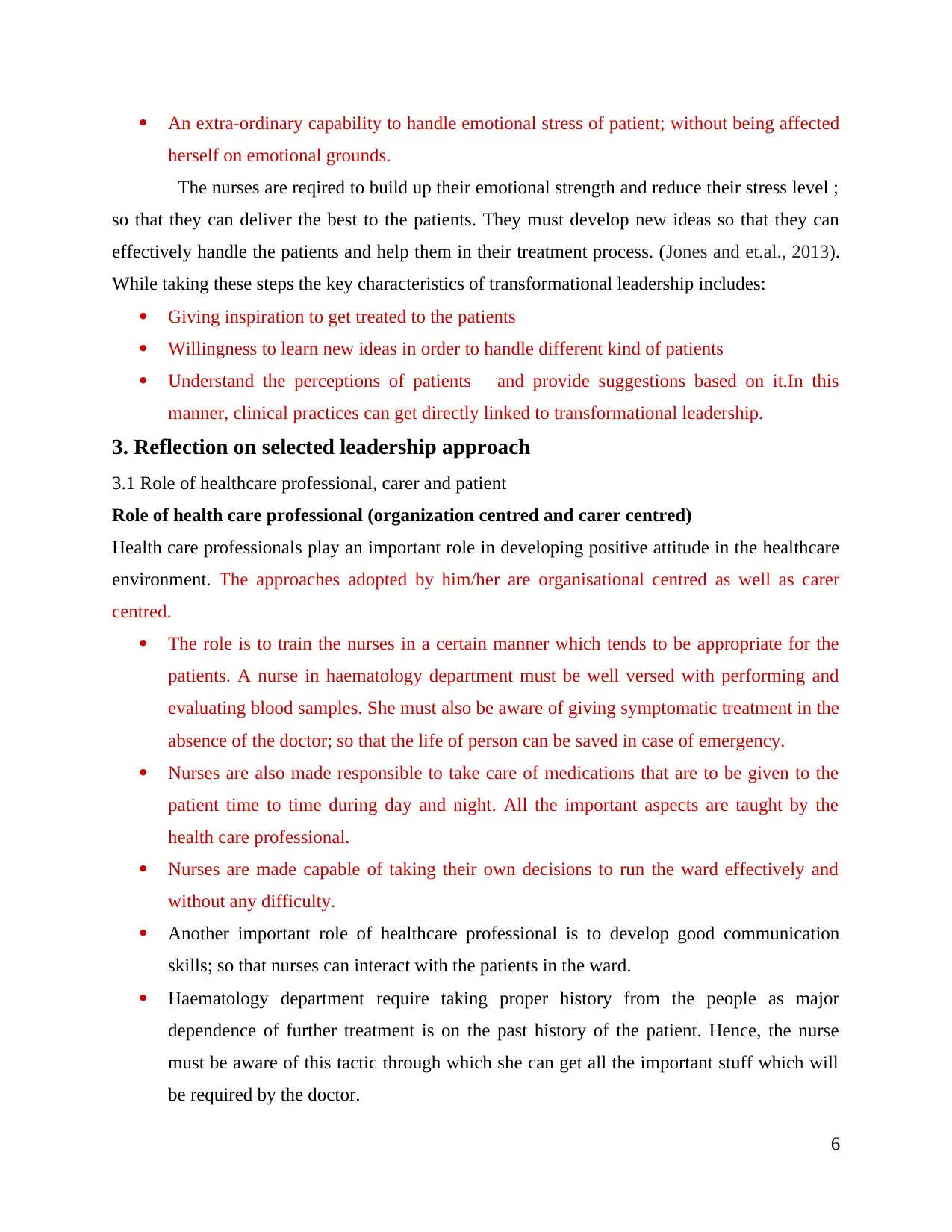
An extra-ordinary capability to handle emotional stress of patient; without being affected
herself on emotional grounds.
The nurses are reqired to build up their emotional strength and reduce their stress level ;
so that they can deliver the best to the patients. They must develop new ideas so that they can
effectively handle the patients and help them in their treatment process. (Jones and et.al., 2013).
While taking these steps the key characteristics of transformational leadership includes:
Giving inspiration to get treated to the patients
Willingness to learn new ideas in order to handle different kind of patients
Understand the perceptions of patients and provide suggestions based on it.In this
manner, clinical practices can get directly linked to transformational leadership.
3. Reflection on selected leadership approach
3.1 Role of healthcare professional, carer and patient
Role of health care professional (organization centred and carer centred)
Health care professionals play an important role in developing positive attitude in the healthcare
environment. The approaches adopted by him/her are organisational centred as well as carer
centred.
The role is to train the nurses in a certain manner which tends to be appropriate for the
patients. A nurse in haematology department must be well versed with performing and
evaluating blood samples. She must also be aware of giving symptomatic treatment in the
absence of the doctor; so that the life of person can be saved in case of emergency.
Nurses are also made responsible to take care of medications that are to be given to the
patient time to time during day and night. All the important aspects are taught by the
health care professional.
Nurses are made capable of taking their own decisions to run the ward effectively and
without any difficulty.
Another important role of healthcare professional is to develop good communication
skills; so that nurses can interact with the patients in the ward.
Haematology department require taking proper history from the people as major
dependence of further treatment is on the past history of the patient. Hence, the nurse
must be aware of this tactic through which she can get all the important stuff which will
be required by the doctor.
6
herself on emotional grounds.
The nurses are reqired to build up their emotional strength and reduce their stress level ;
so that they can deliver the best to the patients. They must develop new ideas so that they can
effectively handle the patients and help them in their treatment process. (Jones and et.al., 2013).
While taking these steps the key characteristics of transformational leadership includes:
Giving inspiration to get treated to the patients
Willingness to learn new ideas in order to handle different kind of patients
Understand the perceptions of patients and provide suggestions based on it.In this
manner, clinical practices can get directly linked to transformational leadership.
3. Reflection on selected leadership approach
3.1 Role of healthcare professional, carer and patient
Role of health care professional (organization centred and carer centred)
Health care professionals play an important role in developing positive attitude in the healthcare
environment. The approaches adopted by him/her are organisational centred as well as carer
centred.
The role is to train the nurses in a certain manner which tends to be appropriate for the
patients. A nurse in haematology department must be well versed with performing and
evaluating blood samples. She must also be aware of giving symptomatic treatment in the
absence of the doctor; so that the life of person can be saved in case of emergency.
Nurses are also made responsible to take care of medications that are to be given to the
patient time to time during day and night. All the important aspects are taught by the
health care professional.
Nurses are made capable of taking their own decisions to run the ward effectively and
without any difficulty.
Another important role of healthcare professional is to develop good communication
skills; so that nurses can interact with the patients in the ward.
Haematology department require taking proper history from the people as major
dependence of further treatment is on the past history of the patient. Hence, the nurse
must be aware of this tactic through which she can get all the important stuff which will
be required by the doctor.
6
Paraphrase This Document
Need a fresh take? Get an instant paraphrase of this document with our AI Paraphraser
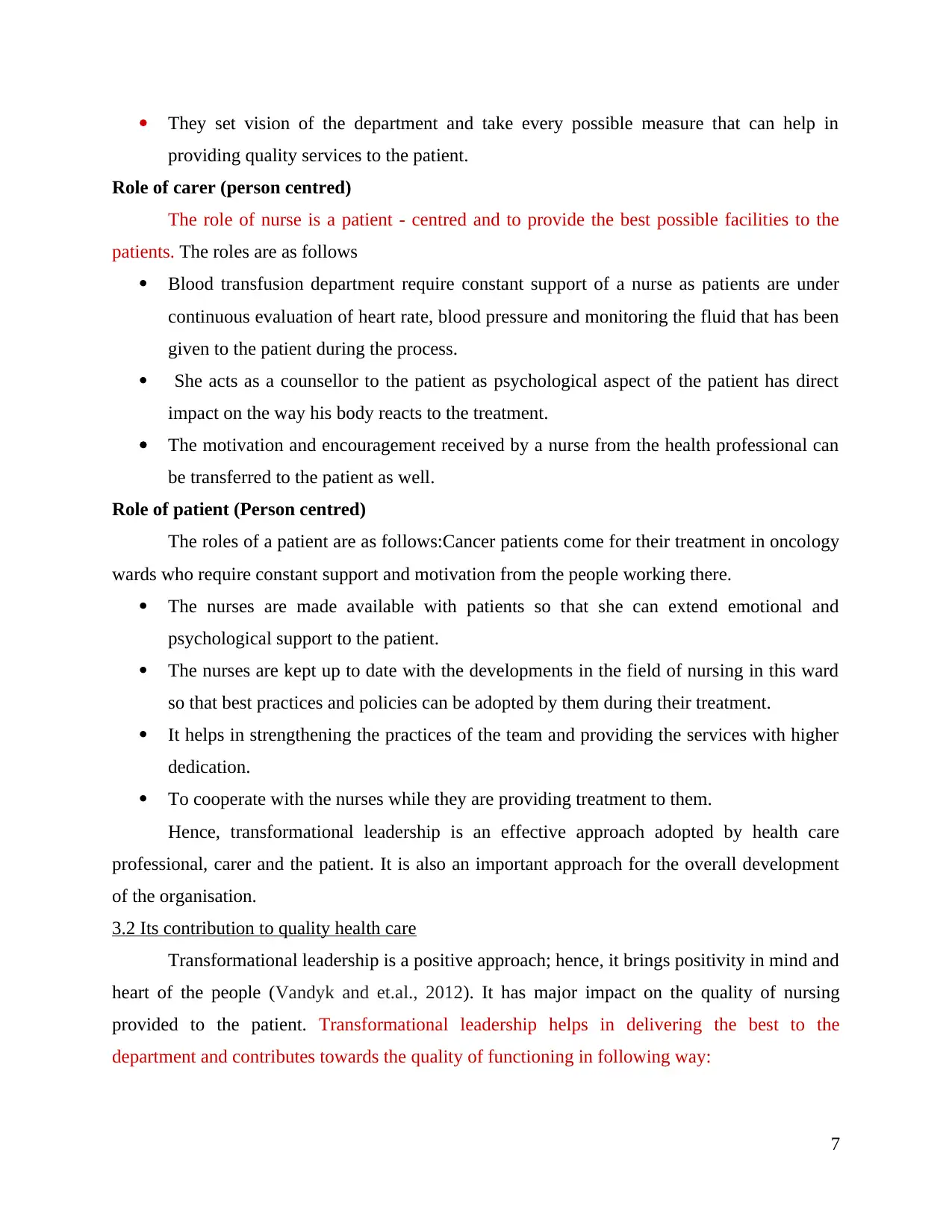
They set vision of the department and take every possible measure that can help in
providing quality services to the patient.
Role of carer (person centred)
The role of nurse is a patient - centred and to provide the best possible facilities to the
patients. The roles are as follows
Blood transfusion department require constant support of a nurse as patients are under
continuous evaluation of heart rate, blood pressure and monitoring the fluid that has been
given to the patient during the process.
She acts as a counsellor to the patient as psychological aspect of the patient has direct
impact on the way his body reacts to the treatment.
The motivation and encouragement received by a nurse from the health professional can
be transferred to the patient as well.
Role of patient (Person centred)
The roles of a patient are as follows:Cancer patients come for their treatment in oncology
wards who require constant support and motivation from the people working there.
The nurses are made available with patients so that she can extend emotional and
psychological support to the patient.
The nurses are kept up to date with the developments in the field of nursing in this ward
so that best practices and policies can be adopted by them during their treatment.
It helps in strengthening the practices of the team and providing the services with higher
dedication.
To cooperate with the nurses while they are providing treatment to them.
Hence, transformational leadership is an effective approach adopted by health care
professional, carer and the patient. It is also an important approach for the overall development
of the organisation.
3.2 Its contribution to quality health care
Transformational leadership is a positive approach; hence, it brings positivity in mind and
heart of the people (Vandyk and et.al., 2012). It has major impact on the quality of nursing
provided to the patient. Transformational leadership helps in delivering the best to the
department and contributes towards the quality of functioning in following way:
7
providing quality services to the patient.
Role of carer (person centred)
The role of nurse is a patient - centred and to provide the best possible facilities to the
patients. The roles are as follows
Blood transfusion department require constant support of a nurse as patients are under
continuous evaluation of heart rate, blood pressure and monitoring the fluid that has been
given to the patient during the process.
She acts as a counsellor to the patient as psychological aspect of the patient has direct
impact on the way his body reacts to the treatment.
The motivation and encouragement received by a nurse from the health professional can
be transferred to the patient as well.
Role of patient (Person centred)
The roles of a patient are as follows:Cancer patients come for their treatment in oncology
wards who require constant support and motivation from the people working there.
The nurses are made available with patients so that she can extend emotional and
psychological support to the patient.
The nurses are kept up to date with the developments in the field of nursing in this ward
so that best practices and policies can be adopted by them during their treatment.
It helps in strengthening the practices of the team and providing the services with higher
dedication.
To cooperate with the nurses while they are providing treatment to them.
Hence, transformational leadership is an effective approach adopted by health care
professional, carer and the patient. It is also an important approach for the overall development
of the organisation.
3.2 Its contribution to quality health care
Transformational leadership is a positive approach; hence, it brings positivity in mind and
heart of the people (Vandyk and et.al., 2012). It has major impact on the quality of nursing
provided to the patient. Transformational leadership helps in delivering the best to the
department and contributes towards the quality of functioning in following way:
7
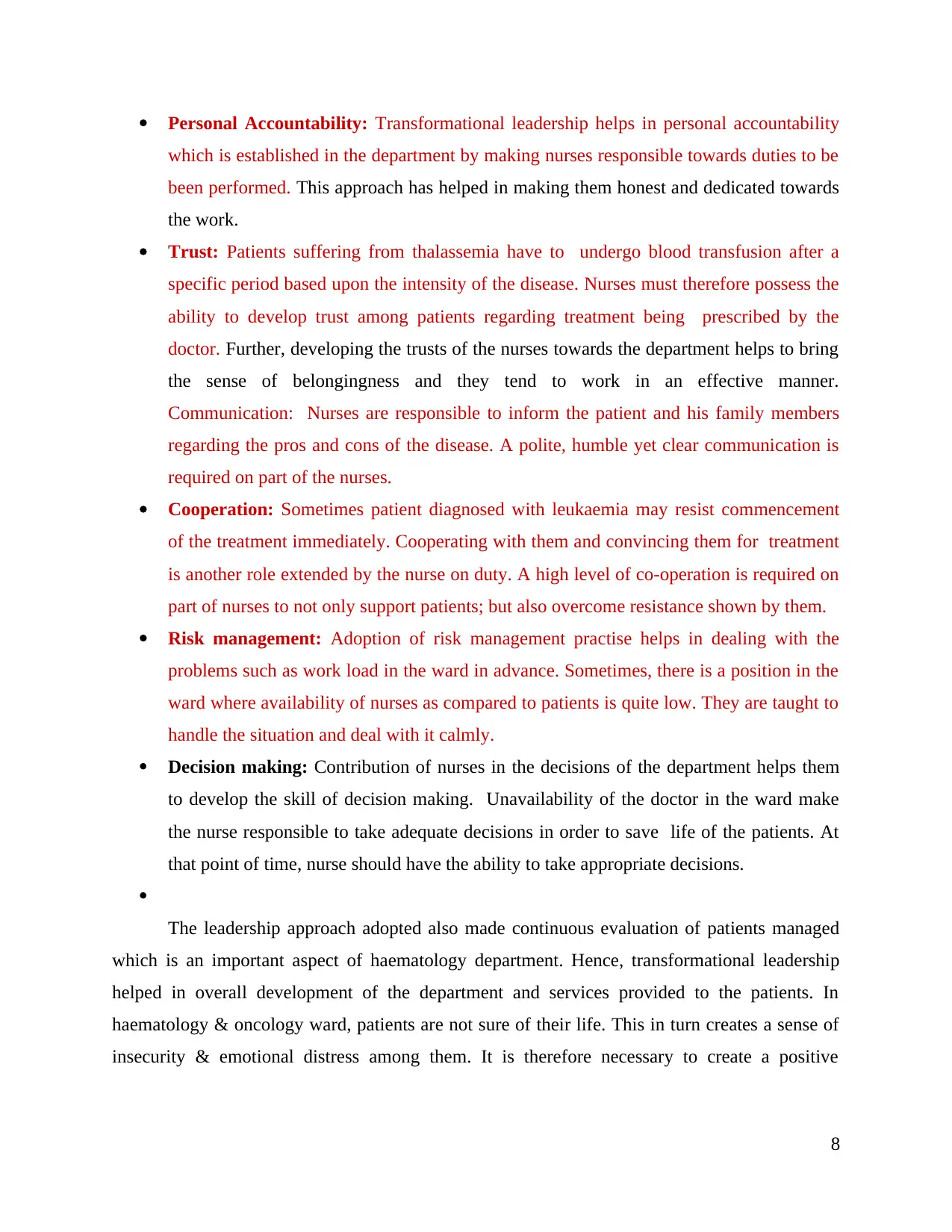
Personal Accountability: Transformational leadership helps in personal accountability
which is established in the department by making nurses responsible towards duties to be
been performed. This approach has helped in making them honest and dedicated towards
the work.
Trust: Patients suffering from thalassemia have to undergo blood transfusion after a
specific period based upon the intensity of the disease. Nurses must therefore possess the
ability to develop trust among patients regarding treatment being prescribed by the
doctor. Further, developing the trusts of the nurses towards the department helps to bring
the sense of belongingness and they tend to work in an effective manner.
Communication: Nurses are responsible to inform the patient and his family members
regarding the pros and cons of the disease. A polite, humble yet clear communication is
required on part of the nurses.
Cooperation: Sometimes patient diagnosed with leukaemia may resist commencement
of the treatment immediately. Cooperating with them and convincing them for treatment
is another role extended by the nurse on duty. A high level of co-operation is required on
part of nurses to not only support patients; but also overcome resistance shown by them.
Risk management: Adoption of risk management practise helps in dealing with the
problems such as work load in the ward in advance. Sometimes, there is a position in the
ward where availability of nurses as compared to patients is quite low. They are taught to
handle the situation and deal with it calmly.
Decision making: Contribution of nurses in the decisions of the department helps them
to develop the skill of decision making. Unavailability of the doctor in the ward make
the nurse responsible to take adequate decisions in order to save life of the patients. At
that point of time, nurse should have the ability to take appropriate decisions.
The leadership approach adopted also made continuous evaluation of patients managed
which is an important aspect of haematology department. Hence, transformational leadership
helped in overall development of the department and services provided to the patients. In
haematology & oncology ward, patients are not sure of their life. This in turn creates a sense of
insecurity & emotional distress among them. It is therefore necessary to create a positive
8
which is established in the department by making nurses responsible towards duties to be
been performed. This approach has helped in making them honest and dedicated towards
the work.
Trust: Patients suffering from thalassemia have to undergo blood transfusion after a
specific period based upon the intensity of the disease. Nurses must therefore possess the
ability to develop trust among patients regarding treatment being prescribed by the
doctor. Further, developing the trusts of the nurses towards the department helps to bring
the sense of belongingness and they tend to work in an effective manner.
Communication: Nurses are responsible to inform the patient and his family members
regarding the pros and cons of the disease. A polite, humble yet clear communication is
required on part of the nurses.
Cooperation: Sometimes patient diagnosed with leukaemia may resist commencement
of the treatment immediately. Cooperating with them and convincing them for treatment
is another role extended by the nurse on duty. A high level of co-operation is required on
part of nurses to not only support patients; but also overcome resistance shown by them.
Risk management: Adoption of risk management practise helps in dealing with the
problems such as work load in the ward in advance. Sometimes, there is a position in the
ward where availability of nurses as compared to patients is quite low. They are taught to
handle the situation and deal with it calmly.
Decision making: Contribution of nurses in the decisions of the department helps them
to develop the skill of decision making. Unavailability of the doctor in the ward make
the nurse responsible to take adequate decisions in order to save life of the patients. At
that point of time, nurse should have the ability to take appropriate decisions.
The leadership approach adopted also made continuous evaluation of patients managed
which is an important aspect of haematology department. Hence, transformational leadership
helped in overall development of the department and services provided to the patients. In
haematology & oncology ward, patients are not sure of their life. This in turn creates a sense of
insecurity & emotional distress among them. It is therefore necessary to create a positive
8
⊘ This is a preview!⊘
Do you want full access?
Subscribe today to unlock all pages.

Trusted by 1+ million students worldwide
1 out of 18
Related Documents
Your All-in-One AI-Powered Toolkit for Academic Success.
+13062052269
info@desklib.com
Available 24*7 on WhatsApp / Email
![[object Object]](/_next/static/media/star-bottom.7253800d.svg)
Unlock your academic potential
Copyright © 2020–2025 A2Z Services. All Rights Reserved. Developed and managed by ZUCOL.





